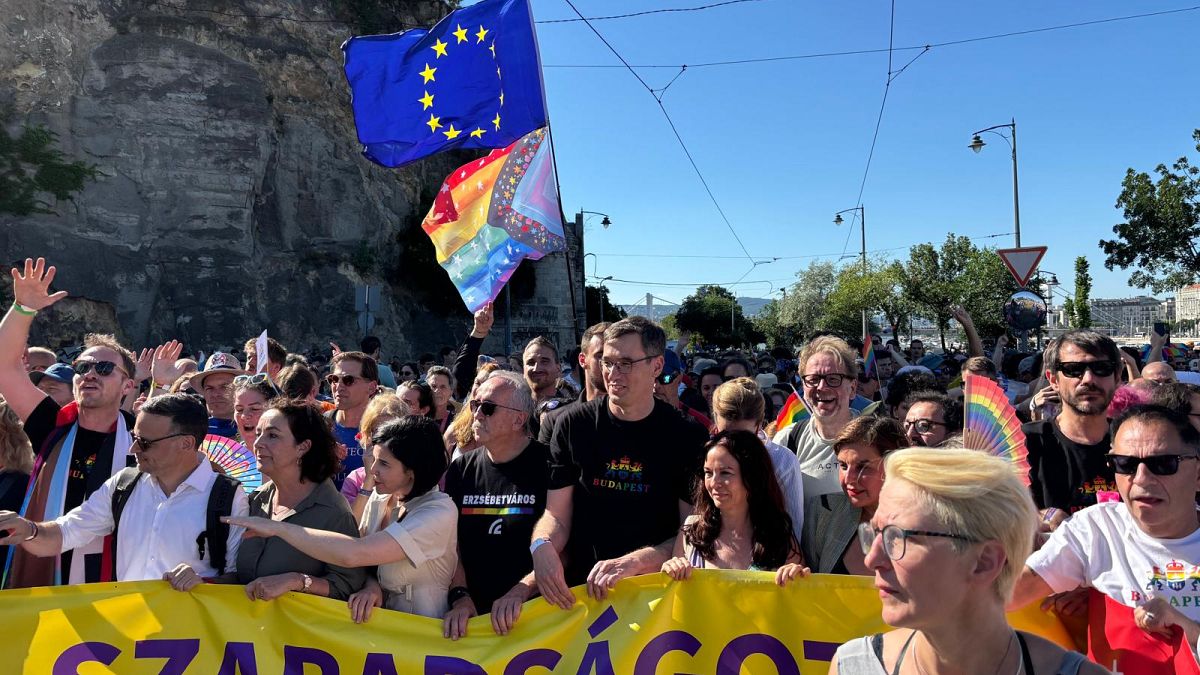

In a remarkable show of solidarity and resilience, the Budapest Pride march celebrated its 30th anniversary by defying a government ban, as tens of thousands took to the streets advocating for civil liberties and equal rights. The vibrant display of unity and courage unfolded amidst increasing political tensions, highlighting the ongoing struggle for LGBTQ+ rights in Hungary.
This year, the Pride events in Budapest were marked by the presence of Commissioner Hadja Lahbib and 70 Members of the European Parliament (MEPs) who traveled to Hungary in a bid to protest the ban imposed by Prime Minister Viktor Orbán’s government. The demonstration was not just a call for LGBTQ+ rights but also a broader demand for maintaining democratic freedoms, especially as the nation gears up for a significant election in the coming year. The display underscored the ongoing efforts to challenge measures perceived as curbing individual liberties.
Despite official threats of legal consequences — which included hefty fines or even a one-year prison sentence for participants — the peaceful march progressed through the city streets, painting them with a spectrum of colors and echoing calls for dignity and equality. Organizers reported attendance numbers ranging from 100,000 to 200,000 participants, making it one of the largest gatherings in recent memory. The streets were alive with chants and music, as marchers carried signs that critiqued the government’s stance and invoked messages of love and acceptance.
The event also drew a response on the European stage. Spanish officials urged a stronger stance from the European Commission against what they described as complicity in allowing the ban to proceed, emphasizing the need for a robust defense of human rights across the European Union. The response signaled a growing concern within the EU about the political trajectory in Hungary and underscored the importance of maintaining principles of non-discrimination and equality as essential European values.
As the march unfolded, participants moved with a palpable sense of unity and determination. The crowds, decked in vibrant attire and waving their pride flags high, moved slowly but surely through Budapest, their resolve unwavering despite the political pressures surrounding them. The mayor of Budapest had previously called for citizens to march “calmly and boldly,” a call that was answered by the thousands who came together to make their voices heard.
While the situation in Hungary highlights ongoing challenges facing the LGBTQ+ community, it also brings into focus a broader context of varying stances on civil liberties within Europe. This is seen in contrasting approaches, such as matically different policies regarding other rights, as illustrated by the debate over Malta’s progressive LGBTQ+ policies juxtaposed with its strict anti-abortion laws. Such diversity across member states continues to ignite discussions on how to balance national policies with EU-wide standards for human rights.
As Budapest Pride 2025 comes to a close, the event stands as a poignant reminder of the power of collective action and the enduring quest for justice and equity. It underscores the importance of both individual courage and international solidarity, reinforcing the ideal that differences enrich rather than divide the human experience. Through adversity, participants found strength in their shared commitment to a future where every individual, regardless of sexual orientation or gender identity, is afforded the respect and rights they deserve.
Source: {link}
